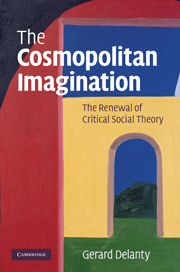Book contents
- Frontmatter
- Contents
- Preface and acknowledgements
- Introduction
- 1 The rise and decline of classical cosmopolitanism
- 2 Contemporary cosmopolitanism and social theory
- 3 Global ethics, solidarity and the problem of violence
- 4 Cosmopolitan citizenship and the post-sovereign state
- 5 Multiculturalism from a cosmopolitan perspective
- 6 Religion in a cosmopolitan society
- 7 Cosmopolitanism, modernity and global history
- 8 Cosmopolitanism and European political community
- 9 Europe as a borderland
- 10 Conclusion: inter-cultural dialogue in a post-Western world
- Bibliography
- Index
Introduction
Published online by Cambridge University Press: 18 January 2010
- Frontmatter
- Contents
- Preface and acknowledgements
- Introduction
- 1 The rise and decline of classical cosmopolitanism
- 2 Contemporary cosmopolitanism and social theory
- 3 Global ethics, solidarity and the problem of violence
- 4 Cosmopolitan citizenship and the post-sovereign state
- 5 Multiculturalism from a cosmopolitan perspective
- 6 Religion in a cosmopolitan society
- 7 Cosmopolitanism, modernity and global history
- 8 Cosmopolitanism and European political community
- 9 Europe as a borderland
- 10 Conclusion: inter-cultural dialogue in a post-Western world
- Bibliography
- Index
Summary
It is now widely accepted that one of the most significant developments in the present time is the enhanced momentum of globalization. Global forces have become more and more visible and take a huge variety of forms, from economic and technological to cultural and political. Globalization has brought about a tremendous transformation of social relations and it is no longer possible to think of nation-states, capitalism, the environment, citizenship, borders, consumption and communication in the same way. Virtually the entire span of human experience is in one way or the other influenced by globalization, by which I mean the overwhelming interconnectivity of the world. Yet the huge significance of globalization has some limits when it comes to social and political theory. There have been major works written on globalization as a societal condition and there has been increased recognition of the significance of transnational politics for political community. However, theories of globalization do not provide an interpretation of the social world that extends the methodological horizon of social analysis beyond a critique of some of the prevailing assumptions of modern social science. Manuel Castells's three-volume work on the information age, perhaps the most comprehensive analysis of globalization, explicitly avoided the elaboration of a normative theoretical framework and remained on an empirical level of analysis (Castells 1996, 1997, 1998). Globalization is a problem to be understood and explained, but it has not produced a significant philosophical or methodological framework.
- Type
- Chapter
- Information
- The Cosmopolitan ImaginationThe Renewal of Critical Social Theory, pp. 1 - 17Publisher: Cambridge University PressPrint publication year: 2009

